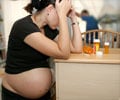Maternal inflammation during pregnancy is potentially connected to mental ailments in children.

Perinatal Factors and Emotional, Cognitive, and Behavioral Dysregulation in Childhood and Adolescence
Go to source). While inflammation is a normal bodily response to injury or infection, the team wanted to learn whether factors linked to inflammation during pregnancy might be associated with dysregulation in children.
‘Potential association between maternal inflammation during pregnancy and the development of anxiety, depression, and aggression in children has been revealed.
#pregnancy, #maternalinflammation, #anxiety, #depression, #children
’





“Dysregulation” in this context refers to children's attention, anxiety depression, and aggression being measurably different from what is typically expected at their age. More youth with dysregulation (35 percent) were born to mothers with prenatal infections compared with 28 percent of youth without dysregulation.
Understanding Inflammation's Role in Child Anxiety
Other maternal factors studied, including being overweight before pregnancy, attaining less education, and smoking during pregnancy, were associated with higher likelihoods of childhood dysregulation.Children and adolescents who had a parent or sibling with a mental health disorder were also more likely to experience dysregulation.
“Addressing factors and treating conditions associated with behavior challenges may help improve outcomes for these children,” said Jean Frazier, of the University of Massachusetts Chan Medical School.
The study also found that boys were more often affected than girls. Researchers used the Child Behaviour Checklist (CBCL) to measure aggressive behavior, anxiety/depression, and attention problems in children.
Advertisement
Reference:
- Perinatal Factors and Emotional, Cognitive, and Behavioral Dysregulation in Childhood and Adolescence - (https://www.sciencedirect.com/science/article/pii/S0890856723002484?via%3Dihub)
Advertisement















